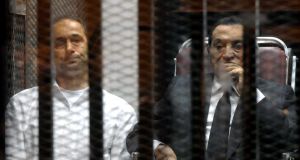 Former Egyptian president Hosni Mubarak (right) and his son Gamal look on from the defendants’ cage inside the courtroom during a sentencing session in Cairo yesterday. Photograph: Ahmed Almasry/EPA
Former Egyptian president Hosni Mubarak (right) and his son Gamal look on from the defendants’ cage inside the courtroom during a sentencing session in Cairo yesterday. Photograph: Ahmed Almasry/EPA
Michael Jansen
In the run-up to next week’s presidential election in Egypt, ousted president Hosni Mubarak was yesterday sentenced to three years’ imprisonment for embezzling funds allocated for the renovation of presidential palaces.
Mubarak appeared in court wearing a grey suit and sitting in a wheelchair. His sons, Alaa and Gamal, in white prison uniform, flanked him in the dock in the Cairo court while the sentences were read out. They both received four years in prison each in the same case.
The three were fined $2.9 million (€2.1 million) and ordered to repay the almost $18 million that the court said they had illegally appropriated to upgrade their private residences.
The men denied the charges and argued that the prosecutors’ case was “completely unsubstantiated”.
Returning gifts
The Mubaraks have already returned about $16 million to the state to settle the case. Four others tried on the same charges were acquitted.Mubarak dealt with another corruption case by returning gifts valued at millions of dollars to public institutions.
Mubarak, who ruled Egypt from 1981 to 2011, was driven from office by a mass uprising, which ushered in a period of political confusion, economic hardship and instability. This in turn prompted millions of Egyptians to look once again to the army to resolve the country’s problems.
Mubarak’s democratically elected successor, Mohamed Morsi of the Muslim Brotherhood, was removed from office by the army in July last year following further mass protests.
The poll to elect a new president takes place next Monday, and Mubarak’s former military intelligence chief, Abdel Fattah al-Sisi, is expected to win by a landslide.
Politicians and wealthy businessmen connected with Mubarak’s banned National Democratic Party remain influential and are campaigning openly for Mr Sisi. His sole rival for the presidency is left-wing nationalist Hamdeen Sabahi, who was arrested 17 times and jailed eight times during Mubarak’s reign.
Human rights organisations argue that the ongoing crackdown on the Muslim Brotherhood and liberal dissidents and continuing violations of civilians’ rights are hangovers from the 30-year Mubarak regime.
Commentators compare the relatively light sentences imposed on the Mubaraks with heavy terms imposed on activists breaching last November’s ban on unauthorised protests and Brotherhood figures sentenced to death for protesting against the ousting of Mr Morsi. He and senior members of the movement have been put on trial for murder, incitement and fraud.
The Mubaraks have been in custody since 2011 but only one year of this time may be reduced from their sentences because the embezzlement charges were levelled only last year.
Mubarak (86) has been held in a military hospital under house arrest since August because he had spent the maximum period of time allowed for pretrial detention. He is awaiting retrial for complicity in the killing of 846 protesters during the 18-day 2011 uprising.
In 2012 he and his interior minister, Habib al-Adly, were sentenced to 25 years in prison but in January 2013 a retrial was ordered on the basis of “procedural failings”


